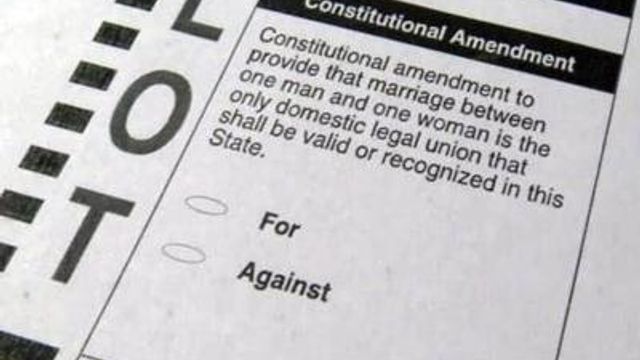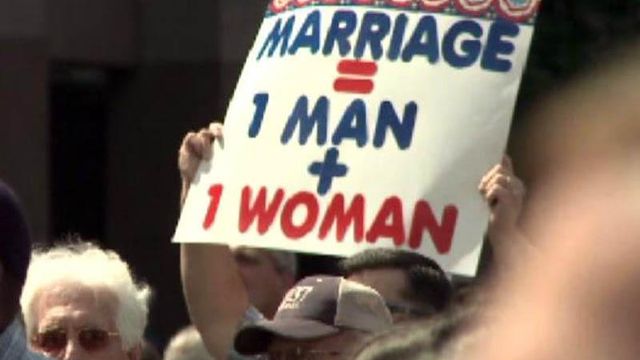No consensus on effects of NC marriage amendment
After months of rallies, marches and heated debate, North Carolina's proposed marriage amendment is less than a week away from the ballot box.
The amendment on the ballot reads, "Marriage between one man and one woman is the only domestic legal union that shall be valid or recognized in this state."
But there's a second sentence to it that is not on the ballot that would also be added to the constitution if the amendment passes: "This section does not prohibit a private party from entering into contracts with another private party; nor does this section prohibit courts from adjudicating the rights of private parties pursuant to such contracts."
The amendment would ban same-sex marriages, civil unions and domestic partnerships for unmarried couples, straight or gay. It could only be changed by another constitutional amendment.
Twenty-eight other states have approved constitutional bans on same-sex marriage, but the bans are not all the same. Some only address marriage, while others go further. No other state has enacted the exact language of North Carolina's amendment.
"This is the most ambiguous of any in the country. If the supporters really wanted to just prohibit same-sex marriage, that's the amendment they should have written. They reached too far," said Suzanne Reynolds, associate dean at the Wake Forest University School of Law.
Reynolds said the phrase "domestic legal union" is not defined in state law. She says a judge could decide it means domestic violence laws don't apply to unmarried couples. That has already happened in Ohio, where court cases were tied up for three years.
Rockingham County District Attorney Phil Berger Jr., the son of Republican Senate Leader Phil Berger, said North Carolina laws are different.
"This amendment will have no impact on domestic violence prosecutions, and the citizens of this state should not be deceived into thinking otherwise," the district attorney said.
Amendment opponents also say it could cut off health insurance benefits for unmarried partners and their children, especially those who are civil employees.
Tami Fitzgerald, chairwoman for Vote FOR Marriage NC, which supports the amendment, said that's not true.
"I think it's speculation on their part. There are no children who will lose their health care," Fitzgerald said.
The second part of the amendment protects private employers' benefits, but not public ones.
"In every state with an amendment as broad as ours, that has been the conclusion – that public employers may not offer benefits to the domestic partners and children of their employees," Reynolds said.
Nine local governments in the state offer domestic partner benefits – Orange, Mecklenburg and Durham counties, and the cities of Durham, Hillsborough, Chapel Hill, Carrboro, Asheville and Greensboro. If the amendment passes, they will have to stop providing those benefits when it takes effect later this month.
Even among legal experts, there's no consensus about the amendment.
The official explanation approved by the state's Constitutional Amendments Publication Commission says the amendment could affect employment-related benefits for domestic partners, domestic violence laws, child custody and visitation rights, and end-of-life arrangements.
"The courts will ultimately make those decisions," the commission said.
Whether or not the amendment passes, same-sex marriage will still be illegal. It has been against the law since 1996, and it has not yet faced a serious challenge.
In the meantime, the tide elsewhere seems to be moving in the other direction. In the past year, lawmakers in New York, Maryland and Washington have passed laws permitting same-sex marriage.
Both sides in North Carolina's fight have accused the other of being funded by out-of-state interests, but each side has raised about 70% of its money from in-state donors.











